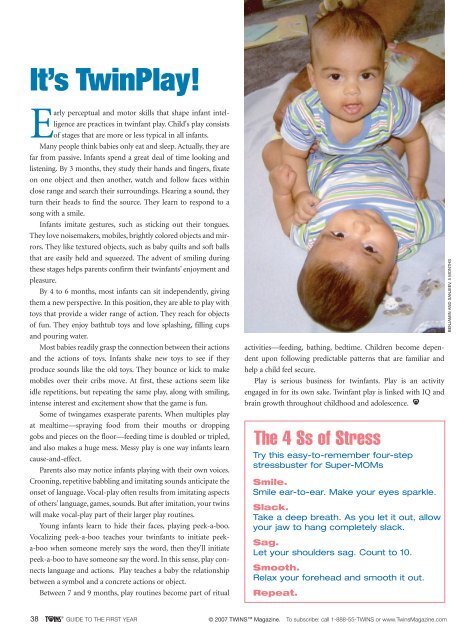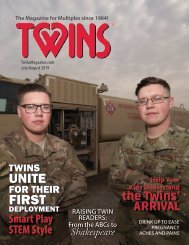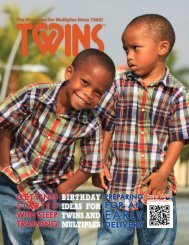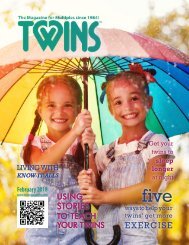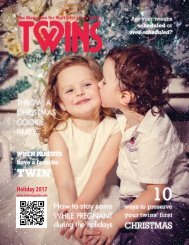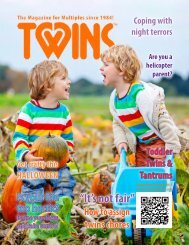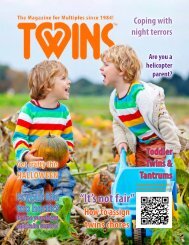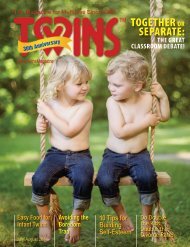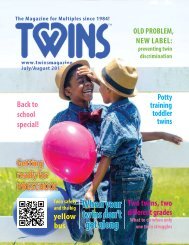2007GuideToTheFirstYear
You also want an ePaper? Increase the reach of your titles
YUMPU automatically turns print PDFs into web optimized ePapers that Google loves.
It’s TwinPlay!<br />
Early perceptual and motor skills that shape infant intelligence<br />
are practices in twinfant play. Child's play consists<br />
of stages that are more or less typical in all infants.<br />
Many people think babies only eat and sleep. Actually, they are<br />
far from passive. Infants spend a great deal of time looking and<br />
listening. By 3 months, they study their hands and fingers, fixate<br />
on one object and then another, watch and follow faces within<br />
close range and search their surroundings. Hearing a sound, they<br />
turn their heads to find the source. They learn to respond to a<br />
song with a smile.<br />
Infants imitate gestures, such as sticking out their tongues.<br />
They love noisemakers, mobiles, brightly colored objects and mirrors.<br />
They like textured objects, such as baby quilts and soft balls<br />
that are easily held and squeezed. The advent of smiling during<br />
these stages helps parents confirm their twinfants’ enjoyment and<br />
pleasure.<br />
By 4 to 6 months, most infants can sit independently, giving<br />
them a new perspective. In this position, they are able to play with<br />
toys that provide a wider range of action. They reach for objects<br />
of fun. They enjoy bathtub toys and love splashing, filling cups<br />
and pouring water.<br />
Most babies readily grasp the connection between their actions<br />
and the actions of toys. Infants shake new toys to see if they<br />
produce sounds like the old toys. They bounce or kick to make<br />
mobiles over their cribs move. At first, these actions seem like<br />
idle repetitions, but repeating the same play, along with smiling,<br />
intense interest and excitement show that the game is fun.<br />
Some of twingames exasperate parents. When multiples play<br />
at mealtime—spraying food from their mouths or dropping<br />
gobs and pieces on the floor—feeding time is doubled or tripled,<br />
and also makes a huge mess. Messy play is one way infants learn<br />
cause-and-effect.<br />
Parents also may notice infants playing with their own voices.<br />
Crooning, repetitive babbling and imitating sounds anticipate the<br />
onset of language. Vocal-play often results from imitating aspects<br />
of others’ language, games, sounds. But after imitation, your twins<br />
will make vocal-play part of their larger play routines.<br />
Young infants learn to hide their faces, playing peek-a-boo.<br />
Vocalizing peek-a-boo teaches your twinfants to initiate peeka-boo<br />
when someone merely says the word, then they'll initiate<br />
peek-a-boo to have someone say the word. In this sense, play connects<br />
language and actions. Play teaches a baby the relationship<br />
between a symbol and a concrete actions or object.<br />
Between 7 and 9 months, play routines become part of ritual<br />
activities—feeding, bathing, bedtime. Children become dependent<br />
upon following predictable patterns that are familiar and<br />
help a child feel secure.<br />
Play is serious business for twinfants. Play is an activity<br />
engaged in for its own sake. Twinfant play is linked with IQ and<br />
brain growth throughout childhood and adolescence.<br />
Try this easy-to-remember four-step<br />
stressbuster for Super-MOMs<br />
Smile.<br />
Smile ear-to-ear. Make your eyes sparkle.<br />
Slack.<br />
Take a deep breath. As you let it out, allow<br />
your jaw to hang completely slack.<br />
Sag.<br />
Let your shoulders sag. Count to 10.<br />
Smooth.<br />
Relax your forehead and smooth it out.<br />
Repeat.<br />
BENJAMIN AND SANJEEV, 5 MONTHS<br />
38 GUIDE TO THE FIRST YEAR © 2007 TWINS Magazine. To subscribe: call 1-888-55-TWINS or www.TwinsMagazine.com


